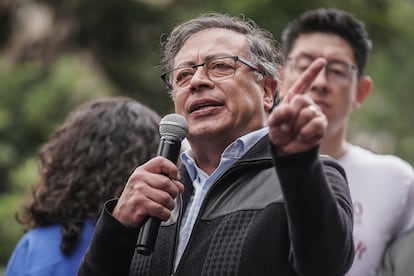In Colombia, public sentiment shifts right as the left loses steam
A year and a half into the government of Gustavo Petro, the president is losing support among centrists, according to a new survey by Cifras y Conceptos


It took the Colombian left some 80 years to come to power. For decades, that side of the political spectrum was dominated by various Marxist-inspired guerrilla movements, and in the Colombian imaginary, behind every leftist project lurked the possibility of evil. Political power alternated for years between centrist or center-right liberals, on the one hand, and right-wing conservatives on the other, creating a political caste that was as addicted to power as it was stagnant and resistant to change. Over time, peace agreements and a social transformation that expanded the middle class, but failed to put an end to deeper, structural inequality, combined to nurture leftism as a valid political option. In 2022, at the hands of former guerrilla Gustavo Petro, the left finally came to power in Colombia, thanks to a massive groundswell of popular support. A year and a half later, that momentum appears to be slowing, and Colombian society is showing its first signs of a return to the right.
A recent survey published by the Colombian research group Cifras y Conceptos shows that the right is more popular than at any point since 2019, with 33% of respondent identifying themselves with that political camp. The left, on the contrary, is experiencing its lowest period of popularity, with 15% of respondents identifying as such. The remaining respondents compose that large group of centrists — the majority that will ultimately tip the balance.
Petro would never have come to power were it not for the support of a large segment of the population who self-identify as centrists. After Colombia’s conservative right closed ranks around millionaire businessman and populist Rodolfo Hernández, this moderate constituency was compelled to vote for the left. Beyond the ballot box, centrists also supported the first actions taken by the new administration, which enjoyed a 56% popularity rating in August 2022. But that support has waned, and the Petro government now faces a 59% disapproval rating. Analyst Yolanda Ruiz believes that Petro still has the power to reverse the trend. “He might have a chance if he can return to the old Petro and make a pact with the center, but it’s going to be very difficult for him to do so. He talks a lot about building a national unity government, but then he does the opposite. The country might be headed toward more extreme radicalization,” she says.
Things are not going the way the president had planned. His reforms, which despite his waning popularity remain relatively in favor among the populace, according to the Cifras y Conceptos survey, nevertheless remain trapped in the political labyrinth of Colombia’s Congress, where Petro does not have a majority. Insecurity, a crucial issue for Colombians who have lived through various forms of violence for more than 50 straight years, is once again on the rise, spurred by the fracturing of criminal groups and the slow progress of the government’s comprehensive peace plan. “In Colombia, we swing on a pendulum between the pursuit of peace and the desire to unleash war. Today, the unleashing of war has less support, but if the left abandons the issue of security, there could be a right-wing shift,” Ruiz warns.
Neighboring countries are imposing a consensus that is gradually taking hold in Colombia. With the victory of Javier Milei, Argentina has become the latest Latin American country to succumb to a populist leader with far-right ideas that promise a total rupture with the current system. In Colombia, a search is already under way for the next right-wing strongman, whose name, two years before the elections, has yet to appear. With former president Álvaro Uribe out of the game and navigating his own judicial labyrinth, and the losing presidential candidates returning to local politics, the opposition to Petro remains blurry, and the right has yet to recover from the credibility crisis caused by the presidency of Iván Duque, which left conservatives without a candidate in the last presidential elections.
Jorge Restrepo, professor at Colombia’s Universidad Javeriana, claims this vacuum has been filled by a public that, through opinion polls like previously cited survey, is sending a message to the current government. “I think it’s very healthy for Colombian democracy that citizens show their discontent in this way,” he says. “It’s a warning to those who govern that the continuity of the leftist project is becoming increasingly difficult.” President Petro’s reforms, and his promises to transform the country, are seen as seeds to be planted during his mandate and fertilized under subsequent governments. But the limited advances made so far by the Executive, along with the president’s disapproval ratings, are complicating the possibility of government continuity in 2026, at least for the time being.
“The question is whether you’re going to get a character [like Milei] who picks up on people’s discontent, or if the center is going to play a role,” Ruiz says. This is the other great debate currently taking place at the tables of power. The political center, with which 52% of the population identifies, has been trying for years to seize an opportunity that has yet to come. During the last preliminary election campaign at the end of 2021, as many as 71% of citizens considered themselves aligned with the center. At the time, a coalition of centrist politicians was attempting to identify a common leader who could capitalize on this trend, but conflicts, leaks from interest groups, public disagreements and political egos combined to foment an atmosphere that would eventually explode with the forced political divorce of Ingrid Betancourt and the coalition, which she left just four months before the elections. The center suffered dismally in the first round.
The expectations of the center tend to outpace reality, because their perspective is filtered through the prism of the political life of the capital. In Bogotá, centrism dominates, bringing together politicians from liberal, social democrat, intellectual and urban backgrounds who cultivate voters among the college-educated middle class. The city’s outgoing mayor, Claudia López, and its incoming mayor, Carlos Fernando Galán, are part of this current, which dissipates as it leaves the city limits, and whose message has yet to resonate with the rest of the country. With Petro close to completing half his term, everyone is trying to find names to put on the table. For now, there is no clear candidate, but the warnings from the right are growing louder and louder. Nevertheless, Petro still has some time on his side.
Sign up for our weekly newsletter to get more English-language news coverage from EL PAÍS USA Edition
Tu suscripción se está usando en otro dispositivo
¿Quieres añadir otro usuario a tu suscripción?
Si continúas leyendo en este dispositivo, no se podrá leer en el otro.
FlechaTu suscripción se está usando en otro dispositivo y solo puedes acceder a EL PAÍS desde un dispositivo a la vez.
Si quieres compartir tu cuenta, cambia tu suscripción a la modalidad Premium, así podrás añadir otro usuario. Cada uno accederá con su propia cuenta de email, lo que os permitirá personalizar vuestra experiencia en EL PAÍS.
¿Tienes una suscripción de empresa? Accede aquí para contratar más cuentas.
En el caso de no saber quién está usando tu cuenta, te recomendamos cambiar tu contraseña aquí.
Si decides continuar compartiendo tu cuenta, este mensaje se mostrará en tu dispositivo y en el de la otra persona que está usando tu cuenta de forma indefinida, afectando a tu experiencia de lectura. Puedes consultar aquí los términos y condiciones de la suscripción digital.








































